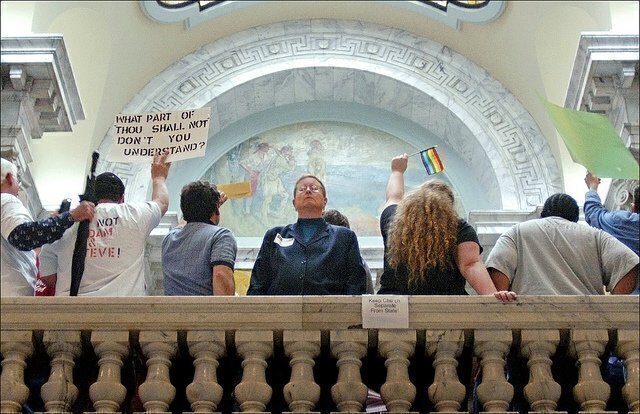
The author will participate in a program on religious liberty at the National Constitution Center on September 21. Learn more and get tickets. Other commentary comes from Marci Hamilton, Douglas Laycock and Kristina Arriaga.
On August 31, in a one-sentence order, the Supreme Court denied Kim Davis’s request to not issue marriage licenses to same-sex couples contrary to her religious beliefs. Mrs. Davis asked for this accommodation in her capacity as the County Clerk of Rowan County, Kentucky.
On September 3, Mrs. Davis was held in contempt of court by Federal District Court Judge David Bunning for still refusing to issue licenses after the Supreme Court's order. She was taken into custody by U.S. marshals.
Mrs. Davis objects not to solemnizing marriages, as many judges around the country have, but instead to issuing the marriage license. For Mrs. Davis, “issuing a same-sex marriage license that contains her signature is the same as her approving the marriage,” a violation of “her Christian beliefs.” Collisions like these are bubbling up around the country in the wake of Obergefell v. Hodges, which legalized same-sex marriage.
No wonder that the Supreme Court made short work of Mrs. Davis’s claim. The Rowan County clerk’s office lists Mrs. Davis as its only employee. If, in fact, Mrs. Davis is the only employee who can issue marriage licenses, or every deputy in the office is unwilling to do so, then shielding her would be tantamount to closing down the state’s marriage function, at least in that part of Kentucky. Couples denied a license would have to travel twenty to fifty miles to receive a license from another office. Since the state has monopoly power on marriage, no individual employee or office should ever erect a chokepoint on the path to marriage, period.
Closing down the state’s marriage function is no different than Arkansas Governor Orval Faubus standing on the front steps of Little Rock’s Central High School, blocking African-American children from entering. Although religious dissenters who work for the government may be reasonably accommodated when it places no undue burden on the office or the co-workers, when objectors seek to block access to the institution of marriage, the objector denies the rights of others. And that violates the rule of law.
That is not to say that religious objectors can never be accommodated. Accommodating different religious beliefs runs throughout the law, as Title VII itself shows. There are worse and better ways, however, to make such concessions for those who now find themselves out-of-sync with new legal entitlements.
Consider North Carolina’s clunky accommodation for people like Mrs. Davis, enacted this summer over Governor Pat McCrory’s veto. It permits marriage registrars and magistrates to recuse themselves from facilitating any marriage, but they must sit out at least six months.
The rub: religious objectors need not invoke the accommodation until the first couple presents. For those who do not think this will be awful for the couple turned away, they need only to talk to David Vincent Moore and his fiancé, who repeatedly presented to Mrs. Davis for a license.
Had North Carolina required objectors to file written requests for accommodation in advance, this kind of offense could have been avoided entirely. Assuming a given clerk’s office has sufficient employees, the office could assign the objector other tasks, such as issuing subpoenas and taking affidavits—far removed from the public, who would never know about the objection.
Note what would not happen in this scenario: no same-sex couple would ever know any individual objector’s views, or be asked to wait or step into another line. Dignitary harms evaporate when accommodations are made invisible.
But an even better way to calm tensions while preserving the dignity of all is to take a page from the groundbreaking Utah Compromise, which advanced the interests of both religious believers and the LGBT community. The country is now where Utah was last spring: confronting a host of questions precipitated by a federal court decision requiring it to recognize same-sex marriage. Utah faced a choice. It could give protections for people of faith who adhere to a traditional view of marriage—and only them—the kind of one-sided deal that many rightly find offensive. Or, Utah could be fundamentally decent to all Utahans.
The Utah Compromise married sorely needed protections against discrimination in housing and hiring for the LGBT community to religious liberty protections for those who adhere to a more traditional view of marriage. For the first time ever, Utah guaranteed everyone access to marriage, using the same process for all. But the Compromise also permitted each office to outsource the solemnization to any willing celebrant in the community, avoiding collisions with people like Mrs. Davis.
By simply outsourcing the solemnization function, Utah bypassed the need to reflexively fire those like Mrs. Davis for their religious refusals. Only if Mrs. Davis, as the elected town clerk, could find no other way to fulfill the state’s function would her job ever be in jeopardy in Utah. And this is as it should be.
Mrs. Davis should not be permitted to lock Mr. Vincent and his fiancé out of marriage when the Supreme Court has spoken. But neither should she lose her job if the state can find creative solutions to avoid that unnecessary result.
Robin Fretwell Wilson is a professor of law at the University of Illinois and recently assisted the Utah Legislature in enacting the Utah Compromise, which balances LGBT rights and religious liberty.







